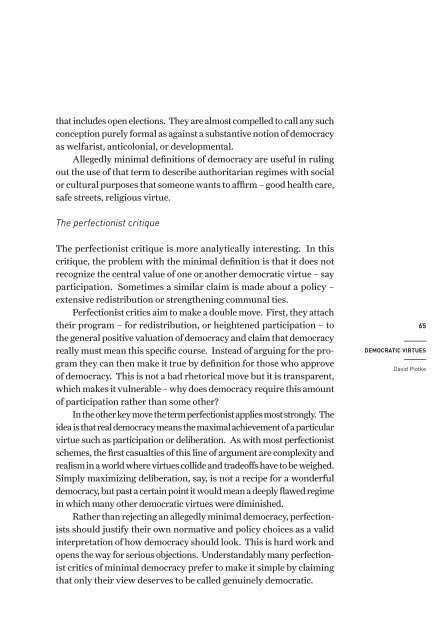Democracy Today.indb - Universidade do Minho
Democracy Today.indb - Universidade do Minho
Democracy Today.indb - Universidade do Minho
Create successful ePaper yourself
Turn your PDF publications into a flip-book with our unique Google optimized e-Paper software.
that includes open elections. They are almost compelled to call any such<br />
conception purely formal as against a substantive notion of democracy<br />
as welfarist, anticolonial, or developmental.<br />
Allegedly minimal definitions of democracy are useful in ruling<br />
out the use of that term to describe authoritarian regimes with social<br />
or cultural purposes that someone wants to affirm – good health care,<br />
safe streets, religious virtue.<br />
The perfectionist critique<br />
The perfectionist critique is more analytically interesting. In this<br />
critique, the problem with the minimal definition is that it <strong>do</strong>es not<br />
recognize the central value of one or another democratic virtue – say<br />
participation. Sometimes a similar claim is made about a policy –<br />
extensive redistribution or strengthening communal ties.<br />
Perfectionist critics aim to make a <strong>do</strong>uble move. First, they attach<br />
their program – for redistribution, or heightened participation – to<br />
the general positive valuation of democracy and claim that democracy<br />
really must mean this specific course. Instead of arguing for the program<br />
they can then make it true by definition for those who approve<br />
of democracy. This is not a bad rhetorical move but it is transparent,<br />
which makes it vulnerable – why <strong>do</strong>es democracy require this amount<br />
of participation rather than some other?<br />
In the other key move the term perfectionist applies most strongly. The<br />
idea is that real democracy means the maximal achievement of a particular<br />
virtue such as participation or deliberation. As with most perfectionist<br />
schemes, the first casualties of this line of argument are complexity and<br />
realism in a world where virtues collide and tradeoffs have to be weighed.<br />
Simply maximizing deliberation, say, is not a recipe for a wonderful<br />
democracy, but past a certain point it would mean a deeply flawed regime<br />
in which many other democratic virtues were diminished.<br />
Rather than rejecting an allegedly minimal democracy, perfectionists<br />
should justify their own normative and policy choices as a valid<br />
interpretation of how democracy should look. This is hard work and<br />
opens the way for serious objections. Understandably many perfectionist<br />
critics of minimal democracy prefer to make it simple by claiming<br />
that only their view deserves to be called genuinely democratic.<br />
65<br />
DEMOCRATIC VIRTUES<br />
David Plotke
















